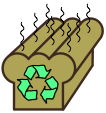
nubake
"Bake" Nu code into compiled object files
About nubake
nubake can be used to "bake" Nu source files into compiled objects. This can be useful for simplifying and adding tamper-resistance to Nu applications.
nubake parses a Nu source file and writes an Objective-C function that, when called, returns the same parsed code structure that you would get by parsing the original source file.
You can then compile and link this into your Nu application and call the new Objective-C function instead of loading the original Nu source file. You can either use nubake to generate a single function, or by adding the "-s" (standalone) option, you can generate a program that can be compiled into a standalone Nu-based binary.
Usage
Invoke nubake with the name of a Nu source file. It also accepts the following arguments:
| -n | to specify the name of the C function that is created. |
| -o | to specify the name of the C output file. |
| -s | to also generate a main() function so that the C output can be compiled standalone. |
Here's an example; we'll say it is in a file named ninetynine.nu:
(99 times:
(do (i)
(set count (- 99 i))
(puts <<-END
#{count} bottles of Nu on the wall
#{count} bottles of Nu
Take one down, pass it around
#{count} bottles of Nu on the wall
END)))
To bake it, use the following command:
% nubake ninetynine.nu -s
Then compile it with gcc:
% gcc ninetynine.m -o ninetynine -framework Cocoa -framework Nu
Now run it.
% ninetynine 99 bottles of Nu on the wall 99 bottles of Nu Take one down, pass it around 99 bottles of Nu on the wall 98 bottles of Nu on the wall 98 bottles of Nu Take one down, pass it around 98 bottles of Nu on the wall 97 bottles of Nu on the wall 97 bottles of Nu Take one down, pass it around 97 bottles of Nu on the wall ...
With options and comments, nubake is a little over 100 lines of code. Its core is a small Nu method:
(+ (id) expandNuExpression:(id) node is
(set result "")
(cond ((eq node nil)
(result appendString:"_nunull()"))
((node isKindOfClass:NuCell)
(result appendString:
(+ "_nucell("
(self expandNuExpression:(node car))
",\n"
(self expandNuExpression:(node cdr))
")")))
((node isKindOfClass:NuSymbol)
(result appendString:
"_nusymbol(#{((node stringValue) characterArray)})"))
((node isKindOfClass:NSString)
(result appendString:"_nustring(#{(node characterArray)})"))
((node isKindOfClass:NSNumber)
(result appendString:"_nunumberd(#{node})"))
((node isKindOfClass:NuRegex)
(result appendString:
"_nuregex(#{((node pattern) characterArray)}, #{(node options)})"))
(else (result appendString:"[ERROR]")))
result)
That's sufficient to turn any parsed Nu code into a nested set of C function calls that produces an equivalent structure. Then that structure can be evaluated with something as simple as (eval my-expression), where my-expression is set to the result of a call to your function. If you want to make that function call from Nu, just wrap it with an instance of NuBridgedFunction:
(set ninetynine
(NuBridgedFunction functionWithName:"ninetynine" signature:"@"))
Then call eval with its results:
(eval (ninetynine))
